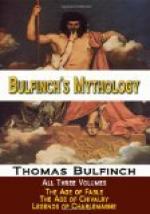Isoude and Tristram embarked together. A favorable wind filled the sails, and promised them a fortunate voyage. The lovers gazed upon one another, and could not repress their sighs. Love seemed to light up all his fires on their lips, as in their hearts. The day was warm; they suffered from thirst. Isoude first complained. Tristram descried the bottle containing the love-draught, which Brengwain had been so imprudent as to leave in sight. He took it, gave some of it to the charming Isoude, and drank the remainder himself. The dog Houdain licked the cup. The ship arrived in Cornwall, and Isoude was married to King Mark, The old monarch was delighted with his bride, and his gratitude to Tristram was unbounded. He loaded him with honors, and made him chamberlain of his palace, thus giving him access to the queen at all times.
In the midst of the festivities of the court which followed the royal marriage, an unknown minstrel one day presented himself, bearing a harp of peculiar construction. He excited the curiosity of King Mark by refusing to play upon it till he should grant him a boon. The king having promised to grant his request, the minstrel, who was none other than the Saracen knight, Sir Palamedes, the lover of the fair Isoude, sung to the harp a lay, in which he demanded Isoude as the promised gift. King Mark could not by the laws of knighthood withhold the boon. The lady was mounted on her horse, and led away by her triumphant lover. Tristram, it is needless to say, was absent at the time, and did not return until their departure. When he heard what had taken place he seized his rote, and hastened to the shore, where Isoude and her new master had already embarked. Tristram played upon his rote, and the sound reached the ears of Isoude, who became so deeply affected, that Sir Palamedes was induced to return with her to land, that they might see the unknown musician. Tristram watched his opportunity, seized the lady’s horse by the bridle, and plunged with her into the forest, tauntingly informing his rival that “what he had got by the harp he had lost by the rote.” Palamedes pursued, and a combat was about to commence, the result of which must have been fatal to one or other of these gallant knights; but Isoude stepped between them, and, addressing Palamedes, said, “You tell me that you love me; you will not then deny me the request I am about to make?” “Lady,” he replied, “I will perform your bidding.” “Leave, then,” said she, “this contest, and repair to King Arthur’s court, and salute Queen Guenever from me; tell her that there are in the world but two ladies, herself and I, and two lovers, hers and mine; and come thou not in future in any place where I am.” Palamedes burst into tears. “Ah, lady,” said he, “I will obey you; but I beseech you that you will not for ever steel your heart against me.” “Palamedes,” she replied, “may I never taste of joy again if I ever quit my first love.” Palamedes then went his way. The lovers remained a week in concealment, after which Tristram restored Isoude to her husband, advising him in future to reward minstrels in some other way.




